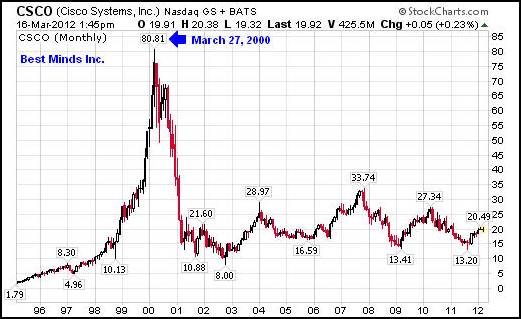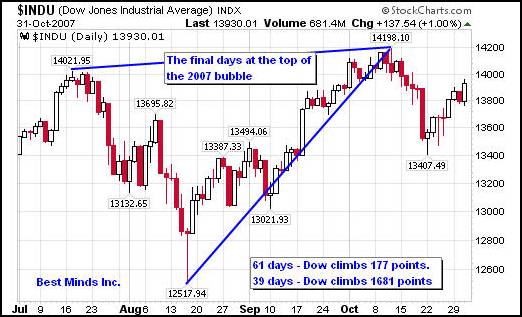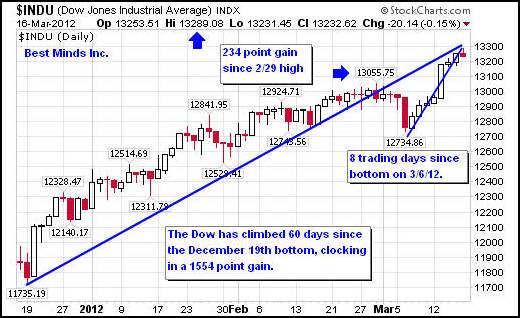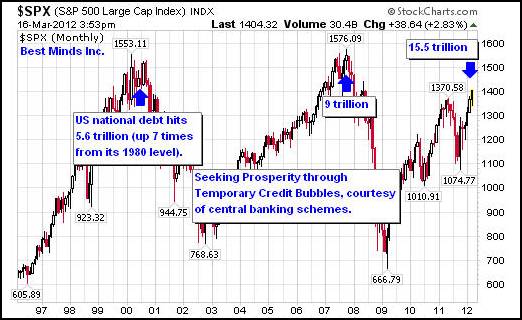Forgetting
the Past
March 16, 2012
Life
is good. Today, Apple’s
new Ipad went on sale, and yesterday, March 15th, its
stock topped $600 a share. The company’s market size is larger than the
entire US retail sector, Exxon (formerly

[Source,
Zero
Hedge, 3/14/12]
Yet,
something appears wrong with this story of “unlimited wealth”. Something seems
familiar about this story from our past. The headlines today, read like ones I
have read before.
Firm’s
Market Cap Climbing to $1 Trillion, Silicon Valley/San Jose Business
Journal, March 19, 2000
One trillion dollars.
That's how much at least one analyst believes
Cisco Systems Inc.Cisco
Systems Inc.will be worth in a few years--and you'd be hard
pressed to find anyone to disagree.
The San Jose-based networking behemoth's stock
closed March 14 at $131.75 a share, slightly down from its March 10 one-year
high of $141.88 (The entire Nasdaq slid 4 percent on March 14.)
Thirty-seven investment banks recommend either a
"buy" or a "strong buy." None recommend a "sell"
or even a "hold."
On any given day the volume of Cisco shares
traded is the equivalent of every man, woman and child living in
Paul Weinstein, an analyst with Credit Suisse
First Boston, believes a $1 trillion market capitalization (stock price
multiplied by shares outstanding) is within reach in a few years. He said
Cisco's stock has increased 1,000 times, a perfect 100 percent annual return
since it launched its IPO in 1990.
"We humbly submit that over the next two to
three years, Cisco could be the first trillion dollar market cap company--and
don't think they wouldn't love it," Mr. Weinstein wrote in his
"strong buy" recommendation.
As of March 14, Microsoft's market cap stood
about $510 billion, compared with Cisco's $465 billion, which is threefold the
annual revenue of the state of
Cicso,
Apple, and the Race to $1 Trillion Market Cap, Silicon Valley/
Apple’sstock
run-up to $500 earlier this month had some wondering if we may see the first
trillion-dollar public company around the corner.
It's
something that hasn't happened before but a number of analysts insist the
But
those with long memories recall that another Silicon Valley company, CiscoSystems,
appeared on a similar path to trillion-dollarhood back in the days of the dot
com bubble.
So
it's worth remembering that in the stock market, what goes up has a way of also
going down, and it's usually best not to get too far ahead of things. Since
hitting a high of $526.29, Apple has slid back to around $511 a share.


What happens when
one stock is owned by 216
hedge funds, 788
stock mutual funds, and makes up more than 17%
of the NASDAQ 100 index? What if the NASDAQ 100 became too concentrated in
a few stocks, until almost 50% of what an investor owned were only 5 companies?
What happens if the crowd starts to sell this stock, seeking to lock in
parabolic gains?
NASDAQ
100 May Soon Be Held Hostage to Apple, Other Tech Behemoths, Huffington
Post, March 9, 2012
Apple
Inc was cut to 12.3 percent from 20.5 percent of the index in April 2011, but a
surge in price has pushed it back up to 17.2 percent -- and the other big names
have seen their share prices balloon as well.
A rebalance of the index will be triggered if Apple grows to more than 24
percent, or if the collective weight of all components over 4.5 percent exceeds
48 percent.
Along with Apple, the four names dominating the average are Google Inc ,
Microsoft Corp , Intel Corp and Oracle Corp . The growth of the top five
companies increases the likelihood that the biggest names in the average will
soon make up 48 percent of the Nasdaq 100 <NDX>.
"When you construct an index that is supposed to be a market benchmark, it
shouldn't just represent a handful of names," said Bronzo.
When you look at
the information above, does it look like investors, both retail and
professional money managers, have learned anything from what took place in March
12 years ago? Have investors, advisors, and money managers become so confident
in the smooth ride up from a bottom in November that they BELIEVE whatever
story endorses their investment savvy in deciding to get on this rocket? What
will happen if a few managers decide to sell 10% of their holdings in order to
take gains and trim their over weighted positions, or something from the real
world causes investors to become less confident in equities?


As we close out
another options week, we have seen the Dow climb 13 straight weeks over 60
trading days, closing down more than 100 points only twice in this stretch.
Those selling out or going short appear as anything but fools, while those
holding on or buying in appear to be geniuses. Yet we all lived through 2000
and 2007, so why not look at some numbers, as I did in my May 2, 2011 article, The
Gallery of Crowd Behavior Returns, to see if we can discover any patterns
with the two largest stock bubbles in American history.



As we can see
from the three charts above, the last 60 days, has produced a smoother ride up
than the final days into the top of 2000 or 2007, thus providing such a
positive emotional experience for investors and traders worldwide, that
preparing for the latest credit bubble to burst is off the radar screen of
millions. However, if we look at debt levels, the greatest lie in modern
history has been and continues to be that by handing our money and lives over
to a small group of individuals to centrally plan a continuous stream of
trillion dollar (or euro or yen) bailouts, that we will continue on the road to
higher “success”.

On November 16,
2011 the US National Debt topped $15 trillion for the first time. On November
25, 2011, Apple stood at $363. On March 16, 2012, the US National debt stands
at $15.5 trillion, and Apple topped the $600 level yesterday. The US national
debt has grown by a half a trillion in 4 months, and Apple has seen its market
cap grow by almost a quarter of a trillion in 4 months. My bet is that one of
these will continue to climb strong, and the other will start descending soon.
But of course, who am I to question the wisdom of “the market” and rising debt
levels.
“If
you go into these offices [stock brokerage offices] when stocks are rising, you
will find a lot of people buying stocks. What I want you to notice is that they
are all buying. And they always buy when stocks are on the upward grade.
Probably one person out of twenty of your people out West play the other side
of the market, and sell short. All the rest buy…..Now remember this thing, when
stocks are moving up, as they now are, it’s the worst sort of time to buy
either for investment or speculation. But you people out West will never learn
that fact, no matter how hard you get hit, no matter how much you may suffer.
You come back again to the game on each rising market, only to be among the
losers when the next bear market comes along, as it inevitably does. …You are
like a flock of sheep following after a bell weather. You never sit down and
think and ask any questions. Now it’s this fact that Wall Street banks on about
once a year. The time to sell is when everybody out West is buying.” [The
Confessions of a Monopolist (1906) Frederic Clemson Howe, pg 54]
The quote on the
banner of the Best Minds Inc website has been the same since going live in
2005. “Those who cannot remember the past are condemned to repeat it,” by
George Santayana. It seems more pertinent today, 7 years later, than it did
then.
If you are interested in our most comprehensive research
and trading commentary, consider a subscription to The Investor's Mind:
Anticipating Trends through the Lens of History.
President
HUBest Minds Inc.UH, a Registered Investment Advisor
Phone - (940) 591 - 3000
Alt - (800) 488 - 2084
Fax - (940) 591 –3006
Best
Minds, Inc is a registered investment advisor that looks to the best minds in
the world of finance and economics to seek a direction for our clients. To be a
true advocate to our clients, we have found it necessary to go well beyond the
norms in financial planning today. We are avid readers. In our study of the
markets, we research general history, financial and economic history,
fundamental and technical analysis, and mass and individual psychology.
Disclaimer: Nothing in this communiqué should be construed as
advice to buy, sell, hold, or sell short. The safest action is to constantly increase
one's knowledge of the money game. To accept the conventional wisdom about the
world of money, without a thorough examination of how that "wisdom"
has stood over time, is to take unnecessary risk. Best Minds, Inc. seeks advice
from a wide variety of individuals, and at any time may or may not agree with
those individual's advice. Challenging one's thinking is the only way to come
to firm conclusions.
Copyright © 2012 Best
Minds Inc.